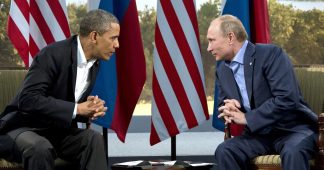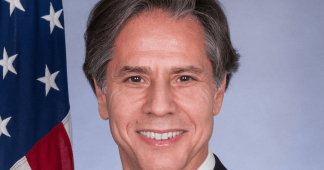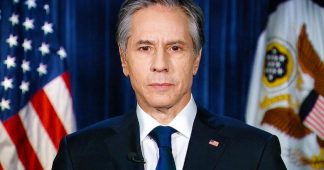By Dimitris Konstantakopoulos
Sometimes, upon reading what the US Secretary of State, Mr. Antony Blinken, is saying or writing, one wonders what the talks between Americans and Russians and the phone calls between Presidents Biden and Putin are all about. One hopes, of course, that what Mr. Blinken says are not the final positions of President Biden himself, to whom his Secretary of State sometimes seems to be in opposition. (The same, by the way, seems to happen in Germany with the theoretically green, in practice quite “black” Foreign Minister of this country. She seems to believe she can save humanity’s natural environment in the midst of escalating Cold Wars that threaten to go hot and nuclear, which is a rather strange kind of “green pacifism”.)
The US Secretary of State, like the vast majority of the western state, media and political personnel, belongs to the category of “neo-Bourbons”, having “learned nothing and forgotten nothing”. With their arrogant policies, they literally forced Putin’s Russia, which was not at all willing to do so, to turn against them and reach out to China. Mr. Blinken, it should be noted, has Ukrainian Jewish roots but, surprisingly, he does not seem to be bothered unduly by Kiev’s dealings with the neo-Nazis – Empire über alles! In the past, Blinken has actively supported the invasion of Iraq, the destruction of Libya, the sending of weapons to the Syrian rebels and the Saudi war that ended in the genocide of the Yemeni people, i.e. all western interventions, decided by US Neocons under Netanyahu’s guidance and planning in the Middle East that were justified with the use of blatant lies and led to untold disasters in an entire region of the world, finally becoming also a disaster for the US Foreign Policy itself and for the global prestige of Washington.
Blinken went even further when he tried – without success – to implement the ideas of the Israeli extremist strategist Odet Yinon, by cutting Iraq into three pieces. One wonders why he does not apply those ideas to the Donbass and Crimea where, if they were to be applied, they would also go a long way to solving the problem in the Ukraine. Why must the Russians who inhabit these regions be ruled by the Ukrainian government? Why not apply to them the principle of self-determination? And if those Russians must be under Kiev’s rule, then why Albanian Kosovars do not have also the obligation to return to Belgrade’s rule?
And why, anyway, more than two hundred years after the great French Revolution and thirty years after the fall of the Berlin Wall, Washington must have a say on the frontiers and the national composition of the European states? Why governments in Europe, including the governments in Berlin and in Paris, are permitting such a situation?
Unfortunately, the generation of western politicians to which Biden belongs is facing a unique problem. They have grown up in the very special environment created by triumphs which they did not win themselves nor deserve, but were served up to them on a plate by the Soviet and then the Russian leaders. As a result they think that every day is New Year’s Eve and some Santa Claus must come and give them presents. They are also the children of a post-1991 Capitalism more deprived than ever of any social and historical philosophy and reference.
Moreover, they have themselves been trapped in their own rather ridiculous views and propaganda about Russia, propagated by a quite totalitarian politics and communication system. For instance they say there is a supposed danger of a Russian invasion of the Ukraine or of the rest of Europe. Why would Russia, which, on its own initiative, without anybody pressing it to do it, or even imagining it would do it, withdrew from Eastern Europe and the former Soviet republics, do such a thing? It would risk a global nuclear confrontation to gain what exactly? Fortunately there are serious people in Washington, like the CIA chief William Burns, who was quick to clarify that his agency, contrary to what the Washington Post writes, has not determined that President Putin has decided to invade the Ukraine (http://www.defenddemocracy.press/cia-director-says-us-intelligence-hasnt-concluded-russia-will-invade-ukraine/). Except that the readers of the American newspaper cannot know this. On the Washington Post’s site you can read the allegations about Putin being ready to invade the Ukraine, but not Burns’s dismissals.
The “Hungary 1956” scenario
It is encouraging, however, that Biden did not do with the Ukrainians what some probably did with the Hungarians in 1956, namely to assure them of the US support in case they cross Moscow’s red lines. Based on such “signals”, the leadership of the Hungarian revolution of 1956 did announce the withdrawal of the country from the Warsaw Pact. Nikita Khrushchev had no any other option left than to order the bloody soviet military intervention in Hungary. This intervention has dealt a huge blow to the democratization – destalinization experiment which was beginning in Moscow and, also, to the still very high prestige of the Soviet Union in Western Europe, as a result of its determining and enormous contribution to the victory over Hitler.
Now Biden, speaking of the terrible economic sanctions he would impose in the event of a Russian “invasion” of the Ukraine and omitting to let open any window for a US military intervention to support Kiev, has explained in fact, implicitly but clearly, to Mr Zelensky that he will let him fight alone, if the Ukrainian President decides to provoke Russia and send his army and his Far Right militias of “volunteers” to Donbass and Lugansk, threatening the security of the Russian population living there and provoking then a Russian intervention. A serious problem, of course, is that Mr Zelensky does not make his own decisions and God knows who makes him do what he does and what he says every time.
West and Democracy in Russia
It is worth opening a parenthesis at this point, since we have referred to what happened in Hungary, back in 1956. As a general rule, the United States, especially the more hawkish tendencies in its establishment, has never been interested in a democratic Russia, neither under “Communism” nor after it; on the contrary, they preferred and were comfortable with a Russia that was as undemocratic as possible.
Unless, of course, one means that Yeltsin’s Russia was a democracy. But this is rather an insult to the very notion of democracy. Yeltsin’s Russia was a banana republic under the control of Washington and of a local mafia oligarchy, the product of decomposition of “Soviet socialism”. Yeltsin’s “democracy” was a regime which went as far as to bomb, in October 1993, at Washington’s urging, its unruly parliament in order to proceed with privatisation. Democracy, as far as we know, means a state (kratos in Greek) of the demos (of the assembly of citizens, of the people), not a state of the mafia, of the oligarchy or of the Americans.
If the USSR were indeed a socialist democracy it would have won the support of all Americans and Europeans after WW2 and it would probably never collapse. That is why the Western hawks had an interest in provoking the intervention in Hungary and why, later, the CIA gave the KGB the names of dissident Soviet writers Siniavsky and Daniel, so that they would be arrested and Soviet prestige again tarnished internationally. And that is by the way why there was not a chance in a billion that the Americans would later help Gorbachev’s modernisation and democratisation project to succeed, as he and his associates had foolishly believed. Some Americans who were sincere had even said so clearly. Why should we wish a modern and democratic USSR, wondered David Ignatius from the columns of the Washington Post at the beginning of Perestroika, when no one could have foreseen that it would lead to the collapse of the USSR?
If Gorbachev’s effort would succeed, then the USSR would become a modern state and a formidable competitor of America. The nature of Capitalism, a deeply hierarchical system of domination and exploitation, is such that it does not want any competitor. It does not like in particular non capitalist regimes, but that does not mean it likes capitalist competitors. This is why the Cold War did not end with the collapse of the “Soviet communism”. This is also a reason the European Union is a mechanism to enslave and exploit its poorer and weaker members, sometimes even to destroy them, like it did with Greece, while the “totalitarian” Soviet Union was a system of transfers from the richer to the poorer Republics. Transfers which even leftist Germans do not want to hear of in the present EU context, as today‘s western leftists are sometimes to the right not only of Lenin but even of Keynes!
Today also, Cold War tendencies in the American establishment (not the Biden trend) don’t want to provoke an “Orange Revolution” in Moscow, because they know it’s impossible – it worked in 1991 and had such results that Russians will never let it happen again. They use the threat rather as a scarecrow, probably hoping to push the Kremlin into authoritarian directions. They would prefer a harsh, neo-Stalinist or ultranationalist or even a far-right regime in Moscow, in order to justify in the eyes of their own public opinion their furious, adventurist and very dangerous anti-Russian policy and the enormous credits for new armaments. They also know that in fact, as we know from de Tocqueville’s time, if not much earlier, ‘hard’, inflexible regimes seem stronger but are in reality more vulnerable (and the example of the collapse of the seemingly so strong Soviet state, provided us with vast proof of that). He who builds castles is becoming a hostage of his walls, as Machiavelli put it.
Anyway, we can be certain of one thing. The Western establishment hates democracy, the rule of people, both inside western countries and in the countries which become the victims of its aggression.
Georgia 2008
The “Hungarian 1956” scenario was repeated in Georgia in 2008. There, Western circles, under the guidance of Dick Cheney, Archangel of War in Washington (http://www.defenddemocracy.press/the-ghost-of-georgia-2008-should-be-haunting-kiev-right-now/ ), probably also through Mr. Bryza, possibly through various other channels (after all, the Minister of Defence and the Minister responsible for Abkhazia and Ossetia of the Tblilissi government had double citizenship, Georgian and Israeli), encouraged the then President of Georgia, Mr. Saakashvili to attack Russian troops in Ossetia, which could not but provoke a Russian military response (the Georgian President has half-confessed it himself to Corriere della Sera at the time, but then was apparently told to shut up and keep quiet). When Russia responded militarily to the military attack on its troops, as was expected and inevitable, the Russian response was used to start the campaign to demonise Russia and Putin in Western public opinion.
The Ukraine: the convergence of Soros and Netanyahu tendencies
Biden has arguably taken few, but still more steps than any other US President in the last fifty years, to the direction of world peace. Those steps include for example the historic decision to withdraw from Afghanistan, the extension of the START treaty on strategic nuclear weapons, the lifting of sanctions on NordStream II, the return to negotiations with Iran. Not to recognize this reality means to commit a strategic error more serious that the ones which led to the surprise attack on USSR in June 1941. Ι don’t believe that Biden will solve the problems of the Earth, because no tendency inside the western capitalist class is able to accomplish such a task which would require the global mobilization of a much wider global alliance and of societies themselves. But I don’t also understand very well why some people are ten times more critical of Biden than they were of the clearly proto-fascistic Trump – Netanyahu International.
In Ukraine, Biden is facing a serious problem he is not facing in the Middle East. In the Middle East both the Soros, the “globalization” tendency inside world Finance and those who followed Brzezinski’s ideas were and are against the war plans of the global Far Right, War and Fascism party (Pompeo, Trump, Bannon, Netanyahu, etc. with the help of Boris Johnson and the British special services). But in the case of the Ukraine, however, we observe a convergence of the Soros and Netanyahu groups against Russia.
Soros (and also Brzezinski in the past) is extremely hostile to Russia, his policies are really shaped by his fanaticism concerning this country. The Netanyahu group exploit the Soros hysteria to pretend they are the friends of Russia and to support it like the rope supports the hung.
Netanyahu’s Israel has intervened forcefully against Russia throughout the former USSR. It did it in Georgia, in Ukraine and in Nagorno-Karabakh among others. They actively participate in the continuing effort to dismantle the USSR, a war that is not over, but which in reality just started in 1991 and is still going on. The Israelis say they are doing this because they are concerned about Iran, but this is nonsense. How the arming of the neo-Nazi Azov militia in Ukraine can help Israelis in their confrontation with Iran?
Of course, if the Israelis are indeed friends of Russia, as they claim, they can use their enormous influence in the US and Western Europe to somehow calm Western anti-Russian hysteria. But they have not done so, nor will they. Unfortunately, the Jewish people, who were on the forefront of the struggle for Socialism, a century ago, are now – in their majority and at least their representatives – in the forefront of the effort to construct a global empire of financial capital and American weapons. Israel is the most aggressive revisionist power (a “hidden superpower” in reality) in the very center of the “wide West”, so powerful it has forbidden to speak about its role! It is very disappointing this because the unique and so painful historical experience of the Jews and their enormous cultural rezerves should teach them better than anybody else where all this can lead us.
The need for a vision
In a previous article we examined how important and crucial the stakes of the US-Russian talks taking place this month are for the whole of international relations, and for the evolution of the situation within the West itself.
Although, of course, given where the West has gone with this, one wonders whether humanity will ultimately be able to avoid a world war.
These talks have been provoked by the crisis in the Ukraine, but one hopes that, at this point, the two sides will find a way to start discussing positive proposals that will establish a positive dynamic and thus help to move towards a global structure that corresponds to the needs of the current level of the development of humanity.
Thirty years ago, in the US-USSR rapprochement that produced the great arms control and disarmament agreements, there were big ideas to spare, but there was a huge deficit in realism.
Mikhail Gorbachev’s ideas were great and some are more relevant today than when they were first formulated. But the Soviet leadership at that time did not know how to implement them, had not studied the conditions for their implementation, and did not have a worked-out strategy. Moreover, the Soviet leadership took its desires for reality and did not realize that Reagan’s or Bush’s America was not interested in these ideas, but only in how to exploit them.
America was playing a game of winning over its rival, while its rival was playing a game to save all and it lost. In order for the next game to succeed for both, no player has the luxury not to be careful not to lose to the other, but this is not enough. They should also look for general solutions for humanity, because we lack time, we are heading very quickly to a global disaster as a species.
Today, between Russia and the United States, one could say that we are in a reverse situation than in 1985-90. We have an excess of “realism” (concerning how not to lose from the other side) and great (not unjustified) suspicion. But we seem to lack a new vision for the world we desperately need.
Also read
US-Russia: A critical crossroads and a window of opportunity for a sick planet











